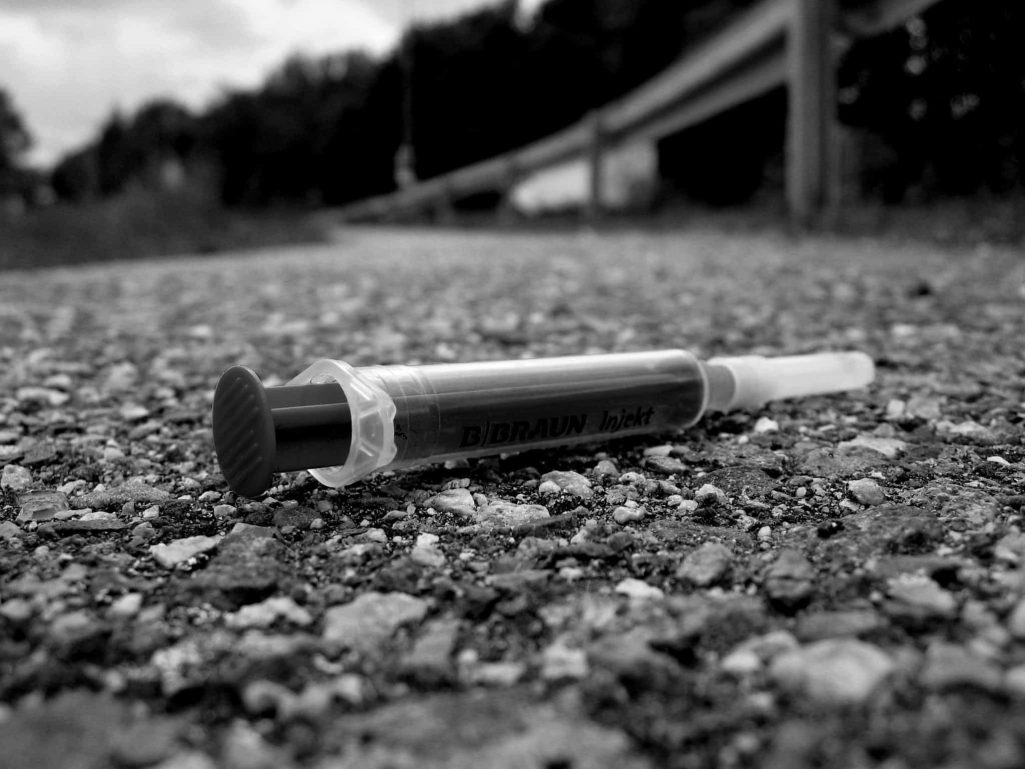
Heroin is derived from poppy seeds. It can be referred to as smack, junk, and brown / brown sugar. It is an extremely addictive drug. Heroin can be smoked or snorted but most users inject it in order to gain maximum effect. It affects the brain, giving an initial rush of happiness and positive feelings. Followed by a calming dream like effect which can make the user not care about anything at all. They may not feel pain – making the drug extremely dangerous. As, for example, if they were getting burnt they might not realise it. Their heart rate and breathing slow right down. It can lead to heroin addiction and too strong a dose can lead to death.
Side effects of heroin addiction and use
If you are concerned that someone might be using heroin, the other effects to look out for are: Warm, flushed skin; if they say they have a dry mouth or that their arms and legs feel heavy; upset stomach and vomiting; itching; being unclear / fuzzy in their thinking / communicating; nodding off – drifting in and out of focus. You may find paraphernalia associated with use. Needles, foil paper which has obviously been used to heat a substance, citric acid which is needed to mix the heroin for injecting.
Long term use of heroin can lead to permanent problems with collapsed veins, contracting HIV / Aids, Hepatitis B and C from the use of dirty needles, liver, kidney and lung disease and damage to the heart, including infections of the lining and valves. Some users get skin infections such as abscesses, cellulitis and sores. Use can also severely affect sleeping patterns. With users often becoming more awake at night and sleeping during the day. Use can also lead to depression, anxiety, overdose and ultimately death through physical damage, suicide and overdose.
An extremely dangerous drug
Few people use heroin as the first drug they use. It tends to be a drug that they progress on to. As they mix with other drug users and dealers and feel the need for something stronger.
Heroin is from the opiate family of drugs. Some prescribed medications are opiates: codeine, tramadol, dihydrocodeine, oxycodone, oramorph, morphine and fentanyl. Methadone is a synthetic opiate that is also addictive. But is also sometimes prescribed to help people stop using heroin. Many addicts will use heroin on top of the methadone they are prescribed. All opiate medications and drugs should be taken with extreme caution as they are addictive in their own right.
The vast majority of people who try heroin will use it more than once and most will then become addicted. It is an extremely dangerous drug taken in any quantity. Less experienced users will have no tolerance and can easily overdose. More experienced users will have built up a tolerance but will need more and more to get the same effect. And so will use in ever more dangerous amounts. If their body does not then receive the amount it is expecting it will go into withdrawal.
Read more about drug addictions.
Heroin withdrawal symptoms
Withdrawal symptoms include an achy body (muscles and bones), chills and shakes, jittery legs (sometimes referred to as restless legs) and vomiting and diarrhoea.
The most comfortable way to stop taking heroin is to have a medically prescribed detox. In the community / if you stay at home, this is likely to involve methadone. However many people find it hard to get off heroin on methadone – or become addicted to the methadone instead. The quickest and most comfortable detox is usually provided in a drug rehabilitation centre and will involve a ‘blocker’ such as buprenorphine (also sometimes described by the brand name Subutex). These will block if not prevent withdrawal symptoms while the drug leaves the body.
There is usually a lot more to addiction to heroin than the physical addiction. The reason the user was taking drugs in the first place is usually due to some psychological or emotional need which can best be addressed in treatment in a drug rehab clinic. There the individual should get all, the counselling and therapy needed to change their life and remain clean and sober on completion of the programme.
Read more about drug addiction in general and also about drug rehabilitation.
